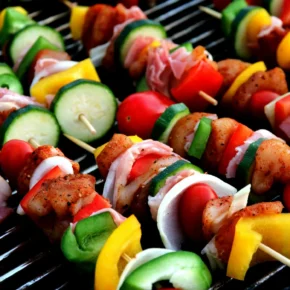There are thousands of cooking terms out there however my goal was to introduce some of the main ones so that you become familiar with them first.
Baste – to spoon or brush pan juices or a marinade over food during cooking to keep it moist & succulent
Bind – to mix liquid or a wet paste into a dry mixture, to bring all the ingredients together.
Blanch – To briefly immerse food in boiling water or hot oil to partially cook it so that the outside is soft while the centre is still crunchy. Often the food is immediately refreshed or plunged into cold water to stop the cooking process and retain colour and texture.
Blind bake – This is when a pastry case is lined with greaseproof paper and filled with baking beans or rice and cooked for a set time before being removed and the actual filling is added for cooking. It ensures the pastry case is fully cooked at the same time as the filling being ready.
Bouquet garni – A group of herbs, bunched together to flavour a stock, stew or even soup. They are removed before serving.
Brown – To fry or roast to achieve a colour and flavour as the natural sugars caramelise, such as a piece of beef.
Butterfly – To slit a piece of food, usually meat, in half, but leaving it attached so that it is opened out. This can be for cooking it more quickly or evenly, or for stuffing.
Caramelise – To cook foods over a high heat until the natural sugars have browned. Also to heat sugar until it dissolves and cooks to a caramel.
Clarify – To remove solid deposits from food, resulting in a clear liquid. Butter is clarified by melting it and then pouring off the golden oils, often through a muslin-lined sieve. Stock can be clarified by bringing it up to the boil with an egg white mixture, which binds together with the solids, then straining it through a muslin-lined sieve.
Confit – To cook something that is immersed in fat. It is often used for cooking duck.
Coulis – A dessert sauce made from puréed fruit, such as berries and mixed with some stock syrup.
Deglaze – To pour liquid, wine or spirit into a hot pan after it has been used to fry food over a high heat. When stirred, the liquid dislodges any sediment stuck on the bottom of the pan. On boiling, the alcohol evaporates leaving a concentrated flavour in the pan, which enhances the taste of the sauce.
Dropping Consistency – This is a term often used for baking to describe the motion of when the mixture will reluctantly drop off the spoon if it is tapped or suspended in the air.
Game – This can be a wild bird, fish or animal that is killed through fishing or hunting before it is cooked.
Fold In – To carefully combine a wet or dry ingredient, or a mixture, into a wet mixture by scooping and turning the combined mixtures with a spatula or a large metal spoon in a figure-of-eight motion. Gently folding is important as it avoids destroying the tiny air bubbles.
Infuse – To soak or steep strong flavourings, such as herbs and spices, in a hot liquid so they impart their aromas.
Julienne – A way of cutting vegetables so that they are evenly thin, like matchsticks.
Jus – This means to cook food within its own naturally released juices. It is often a light meaty sauce with added vegetables, stock and wine.
Macerate – To soak food in liquid or alcohol so that they soften and absorb the flavourings of the liquid. For example, fruit is often soaked in wine, liqueur or stock syrup to tenderise and provide another flavour dimension.
Parboil – To partly cook by boiling i.e. potatoes.
Poach – To cook food gently by immersing in a liquid such as water, stock or sugar syrup.
Purée – To liquify foods into a smooth paste.
Reduce – To boil a liquid over a very high heat until it has mostly evaporated and thickened.
Sauté – To brown a small quantity of food, usually fish or meat, in butter or oil over a high heat and ensuring it is cooked quickly and evenly.
Scald – To lightly fry ingredients such as milk just until bubbles begin to appear around the sides of the pan.
Sweat – To gently fry food with a little oil in a covered pan. The steam in the pan will keep the food moist and prevent it from browning.
Zest – Involves grating the outer skin of a citrus fruit, such as an orange or lime, for added flavouring of the dish.


